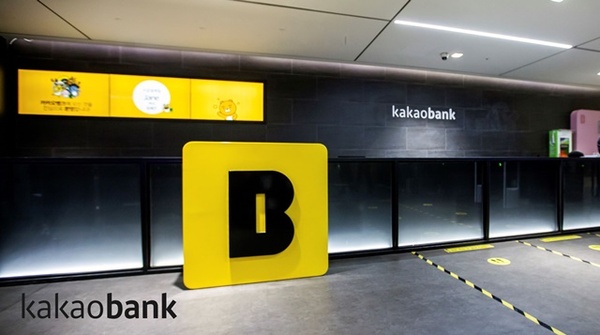
Internet bank becomes Korea’s most valuable financial firm
Korea’s internet-only lender Kakao Bank has become the most valuable financial company in the country as soon as it was floated on the Seoul bourse on Aug. 6.After opening at 53,700($46.86), the share price of Kakao Bank soared a daily limit of 29.98 percent to reach on Day one and further rose 12.46 percent Monday to finish at 78,500 won.As a result, its market capitalization amounted to 37.3 trillion won ($32.5 billion) on Aug. 9 to become the 10th most valuable corporation in Korea, surpassing the country’s top banking groups of KB and Shinhan.“It’s unbelievable that an internet bank beats large-sized lenders in the stock market. The rich liquidity appears to prompt investors to rush to Kakao Bank, which is freer from government regulations,” Prof. Lee Phil-sang at Seoul National University said.In many measures, Kakao Bank is not comparable to the previous champion of KB Kookmin Bank, which runs almost 1,000 branches with around 15,000 employees. Its asset is more than 40 trillion won.In contrast, Kakao Bank, with some 1,000 workers on its payroll, has no offline branch, and its asset is just around 3 trillion won.However, some observers point out that the internet lender has upside potential as many young customers take advantage of the platform, and the number of adult clients is going up.Kakao Bank is a unit of internet company Kakao, which has a broad user base thanks to its KakaoTalk instant messaging service.Its around-the-clock service and convenience have attracted young customers who are used to smartphone-based financial services.Kakao Bank CEO Yun Ho-young told a press conference last month that 39 percent of those aged between 14 and 19 uses Kakao Bank services, while the proportion is 15 percent for people aged 50 or older, up from 9 percent in 2017.Not all watchers are optimistic about the future of Kakao Bank in the stock market as its price-earnings ratio is higher than 250. The ratios of KB and Shinhan are less than six, respectively.Prof. Lee from Seoul National University suspected whether the high stock price could be sustained. Prof. Jung Yu-sin at Sogang University was also cautious.“Kakao Bank has a unique business model, which is different from other digital lenders in other countries. Hence, it does not have a benchmark to compare with,” Jung said via telephone.“If young customers of Kakao Bank remain loyal to its service, the high valuation may be acceptable. But there is no guarantee of it.”이 기사를 공유합니다
Hillary Lee
(homin30@hanmail.net)

